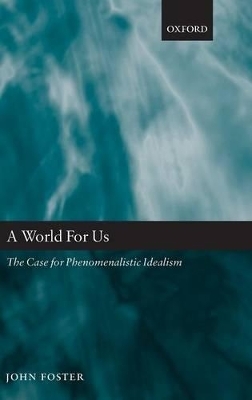
A World for Us
The Case for Phenomenalistic Idealism
Seiten
2008
Oxford University Press (Verlag)
978-0-19-929713-9 (ISBN)
Oxford University Press (Verlag)
978-0-19-929713-9 (ISBN)
A World For Us aims to show that the physical world does not exist independently of the human mind, but draws its existence from the way in which, under God's ordinance, things appear to us in experience.
A World for Us aims to refute physical realism and establish in its place a form of idealism. Physical realism, in the sense in which John Foster understands it, takes the physical world to be something whose existence is both logically independent of the human mind and metaphysically fundamental. Foster identifies a number of problems for this realist view, but his main objection is that it does not accord the world the requisite empirical immanence. The form of idealism that he tries to establish in its place rejects the realist view in both its aspects. It takes the world to be something whose existence is ultimately constituted by facts about human sensory experience, or by some richer complex of non-physical facts in which such experiential facts centrally feature. Foster calls this phenomenalistic idealism. He tries to establish a specific version of such phenomenalistic idealism, in which the experiential facts that centrally feature in the constitutive creation of the world are ones that concern the organization of human sensory experience. The basic idea of this version is that, in the context of certain other constitutively relevant factors, this sensory organization creates the physical world by disposing things to appear systematically world-wise at the human empirical viewpoint. Chief among these other relevant factors is the role of God as the one who is responsible for the sensory organization and ordains the system of appearance it yields. It is this that gives the idealistically created world its objectivity and allows it to qualify as a real world.
A World for Us aims to refute physical realism and establish in its place a form of idealism. Physical realism, in the sense in which John Foster understands it, takes the physical world to be something whose existence is both logically independent of the human mind and metaphysically fundamental. Foster identifies a number of problems for this realist view, but his main objection is that it does not accord the world the requisite empirical immanence. The form of idealism that he tries to establish in its place rejects the realist view in both its aspects. It takes the world to be something whose existence is ultimately constituted by facts about human sensory experience, or by some richer complex of non-physical facts in which such experiential facts centrally feature. Foster calls this phenomenalistic idealism. He tries to establish a specific version of such phenomenalistic idealism, in which the experiential facts that centrally feature in the constitutive creation of the world are ones that concern the organization of human sensory experience. The basic idea of this version is that, in the context of certain other constitutively relevant factors, this sensory organization creates the physical world by disposing things to appear systematically world-wise at the human empirical viewpoint. Chief among these other relevant factors is the role of God as the one who is responsible for the sensory organization and ordains the system of appearance it yields. It is this that gives the idealistically created world its objectivity and allows it to qualify as a real world.
John Foster was tutorial Fellow of Brasenose College 1966-2005 and was then been an Emeritus Fellow until 2009. His research interests have been in the fields of metaphysics, epistemology, mind, and language. He is the author of The Case for Idealism (1982), Ayer (1985), The Immaterial Self (1991), The Nature of Perception (2000), and The Divine Lawmaker (2004).
1. The Problem of Perception ; 2. The Inscrutability of Intrinsic Content ; 3. Realism and Phenomenalistic Idealism ; 4. The Refutation of Realism ; 5. The Challenge of Nihilism ; 6. The Issue of Objectivity ; References
| Erscheint lt. Verlag | 24.4.2008 |
|---|---|
| Verlagsort | Oxford |
| Sprache | englisch |
| Maße | 162 x 241 mm |
| Gewicht | 570 g |
| Themenwelt | Geisteswissenschaften ► Philosophie ► Erkenntnistheorie / Wissenschaftstheorie |
| Geisteswissenschaften ► Philosophie ► Metaphysik / Ontologie | |
| Geisteswissenschaften ► Religion / Theologie | |
| ISBN-10 | 0-19-929713-4 / 0199297134 |
| ISBN-13 | 978-0-19-929713-9 / 9780199297139 |
| Zustand | Neuware |
| Haben Sie eine Frage zum Produkt? |
Mehr entdecken
aus dem Bereich
aus dem Bereich
die Grundlegung der modernen Philosophie
Buch | Softcover (2023)
C.H.Beck (Verlag)
18,00 €
Vorlesung Wintersemester 1951/52. [Was bedeutet das alles?]
Buch | Softcover (2023)
Reclam, Philipp (Verlag)
7,00 €


